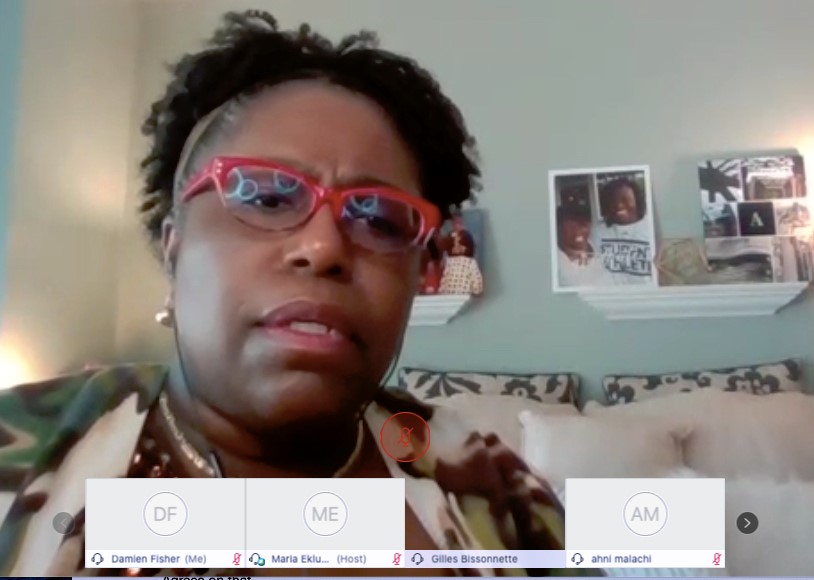By DAMIEN FISHER, InDepthNH.org
The state should have an independent commission to hear and investigate accusations of police misconduct, and sustained findings against officers should be made open to the public, according to a set of recommendations being proposed by the New Hampshire Attorney General’s Office.
“We, as a state, should speak with one voice when it comes to holding our public officials accountable,” said Deputy Attorney General Jane Young.
Young, who is chairing the Law Enforcement Commission on Accountability, Community and Transparency, presented the Attorney General’s recommendations for dealing with police discipline at Wednesday’s meeting. Along with creating the new commission, Young put forward recommendations for a dedicated public integrity unit within the Attorney General’s Office to prosecute alleged crimes committed by police officers, and mandate for implicit bias training for all prosecutors in the state.
The new investigating commission mirrors the New Hampshire Attorney Discipline System and would be made up of 23 members. The membership of the hearing commission would include law enforcement, lawyers, and members of the public. Young said complaints would be investigated by staff, and then hearings brought before the commission. Officers would have the opportunity to have their side of the story heard by the commission.
“There has to be fairness and due process for all concerned,” Young said.
Any sustained finding of misconduct by a police officer would be made public, she said. It’s not clear if unfounded complaints against police would be public, as they are for attorneys under that discipline system. Young characterized her recommendations Wednesday as a framework to build upon.
Young did not address what would happen to the Laurie List, or Exculpatory Evidence Schedule, the secret list of police officers found to have credibility issues ranging from lying to committing a crime. Young did say that the Laurie List is problematic.
“The Exculpatory Evidence Schedule does not move forward the objectives of transparency and accountability,” Young said.
A Superior Court judge ruled last year that the Laurie List is a public record, but the Attorney General’s Office is fighting that ruling to the New Hampshire Supreme Court. Oral arguments on the state’s appeal are scheduled for next month. Young declined to get into details about the future of the Laurie List given the pending litigation.
Young’s recommendations include adding elected sheriffs to the law enforcement officers who can be brought before the new commission. The commission would also have the authority to audit individual police department’s internal affairs investigation files.
The cost for the new commission is estimated to be more than $1 million a year, Young said, similar to the attorney discipline system. The attorney discipline system is under the authority of the Supreme Court. Young said the commission would be independent and not part of the Attorney General’s Office.
Young’s recommendations came as a surprise to the other commission members, as they did not get an advanced copy of her presentation. Wednesday’s hearing started off with commission member Anhi Malachi questioning fellow commissioner Gilles Bissonnette’s presentation about racial disparities in policing.
Bissonnette, legal director with the ACLU-NH, gave a Tuesday presentation partially on the racial discrimination present in the criminal justice system. Malachi, who is the executive director of the New Hampshire Human Rights Commission, questioned the assertion that New Hampshire has a racial disparity problem. She said Bissonnette’s data was incomplete.
“It feels like we’re assuming a lot of things based on limited data here,” Malachi said.
Bissonnette presented data from the New Hampshire Department of Corrections showing that 6 percent of the state’s prison population is African American, while the state’s African American population in total is about 2 to 3 percent. Malachi suggested that the African American prisoners may deserve to be in prison depending on the severity of their crimes.
“I guess the question that needs to be asked and answered is what are they incarcerated for,” Malachi said. “I don’t know how fair it is to upend a system for some disparity that may or may not exist.”
Malachi expressed skepticism at Bissonnette’s data that shows nationally African Americans do not commit crimes at a greater rate than others. If Bissonnette’s data were accepted, it would indicate New Hampshire has a racial disparity problem in the criminal justice system.
“Is it fair to say there is an over representation because people are being over prosecuted or is there an over representation because there is more crime being committed,” Malachi asked.
The commission is due to send a report to Gov. Chris Sununu with recommendations by the end of the month.





